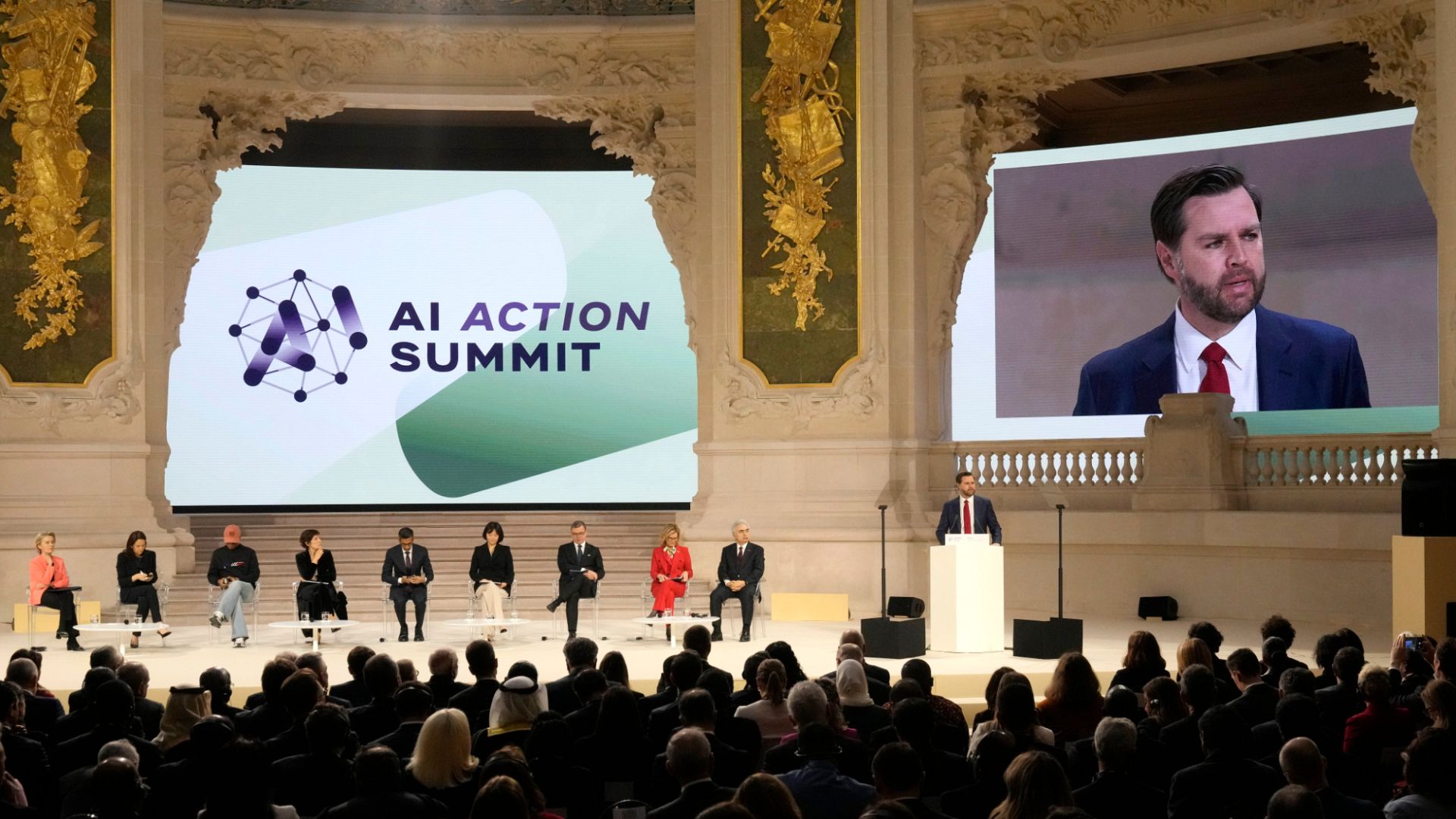Can France Save Europe’s Ambition in the AI Race?

“The EU’s AI Act was the first major law in the world governing AI to go into effect in 2024.”
The European continent, which does not control its digital tools, seeks to become a major tech power similar to the American Silicon Valley.
Therefore, the EU wants its own AI program capable of competing with America's ChatGPT and China's Deepseek.
L'Express, a French weekly news magazine, stated that the French Mistral AI may be the only hope for Europe to return to the global AI race.
However, there are those who believe that the EU has already lost the battle, and Europeans will not have the means to keep up with the huge investments made by American companies in this sector.
In 2024, the share of AI venture capital funds in the EU did not exceed 5%, compared to 52% in the U.S. and 40% in China.
News that China and Russia may form a potential AI alliance adds urgency to Europe.
French Investments
The AI Action Summit in Paris, which took place on February 10-11, is part of France’s efforts to strengthen its position as a leading force in AI governance, leveraging its prominent role in global forums and EU policies on the subject.
France has sought to use the summit as a diplomatic platform bringing together major AI powers such as the U.S., China, the EU and India, in an attempt to attract investment in the AI sector, which could strengthen its position as a key player in the global digital economy.
To boost its competitiveness, France has sought to position itself as an ideal host for data centers, building on its low-carbon nuclear power generation advantage to attract investors in this vital sector.
Ahead of the summit, French President Emmanuel Macron was keen to highlight France’s tech sector, which includes some 750 AI startups.
He announced the allocation of €109 billion to the AI sector, calling on Europe to become an AI powerhouse rather than just a consumer.
The massive French investment reflects his country’s commitment to making AI a major driver of economic growth, by building advanced data centers and improving digital infrastructure.
In a related context, the UAE announced its participation in the French AI investment plan worth between $30 and 50 billion, while the Canadian investment fund Brookfield pledged €20 billion to establish multiple data centers.
The French move is seen as a strategic response to both the American Stargate initiative, which plans to invest more than $500 billion in AI infrastructure, and to China’s ambitious AI strategy 2030.
Even if France cannot master all the tech needed to develop AI systems, it must create its own algorithms, said Bertrand Rondepierre, director of the French ministerial agency for military AI.
In mid-January, Macron met at the Élysée Palace with the cream of the French tech industry, including CEO of Mistral Arthur Mensch, CEO of Helsing France Antoine Bordes, and tech entrepreneur Xavier Niel.
The tech billionaires had one clear message for Macron, “Europe is in danger of falling out of the global AI leadership race.”

New tech Revolution
In the same context, the Paris Summit resulted in a number of important outcomes, the most prominent of which was the adoption of a declaration emphasizing the development of AI in a comprehensive and sustainable manner.
This declaration was supported by 60 countries, including France, China, India, Japan, Australia, and Canada, which stressed the need to ensure that AI technologies are safe, ethical, and beneficial to all people.
The Paris Declaration also stressed the importance of preventing the dominance of a limited number of large companies in the field of AI, by promoting a competitive environment that provides opportunities for a wide range of actors, including emerging companies and developing countries.
The agreement comes as the EU begins implementing its AI law, the world’s first comprehensive legislation regulating the sector, which came into effect in August 2024 but has been criticised by companies and countries, such as France, which say the law could stifle innovation.
While France and Europe sought to establish themselves as major competitors in the field of AI, the Paris summit failed to secure US and British consensus on its outcomes, confirming the outbreak of a new arena of global competition over AI technologies and their management styles.
The summit witnessed a clear division between countries regarding the regulations related to AI, as the U.S., the UK and other players in the sector refused to sign the final declaration.
In turn, US Vice President J.D. Vance warned the Europeans against imposing strict regulations on this new tech that could hinder innovation and limit economic benefits, assuring them that the U.S. is the leader in the field of AI and intends to maintain this leadership.
He also called for a more flexible approach, stressing that AI has the potential to lead a new industrial revolution.
Vance’s remarks reflected the widening differences in the three points of view on AI, as the U.S., under President Trump, advocates an approach that calls for non-interference in creativity and innovation, while Europe tightens restrictions through strict regulations to ensure safety and accountability.
At the same time, China is rapidly developing its own AI technologies, with state-backed tech giants vying for dominance in the global race.

AI Race
While AI has become a real issue of state sovereignty, Paris wants to spark a European awakening to put the continent on the global AI map, where companies that dominate these technologies in France and Europe will be among the world’s leaders in the future.
In the face of the US and Chinese giants, the EU is currently absent, according to global experts, as its countries have invested little in AI, and are now constrained by the high cost of energy and an obsession with regulation.
While the U.S. has dominated the market so far, Europe sees China’s recent rise as evidence that it is possible to return to the global race if the necessary means are provided.
Last week, more than 60 major companies, such as Airbus, Spotify, Mistral, and L’Oréal, recently announced the launch of a coalition aimed at making Europe a world leader in AI.
Future forecasts suggest that the European AI industry may move towards specialization in specific areas, rather than trying to compete with the American and Chinese giants in basic generative AI technologies that require huge investments.
Michael Jackson, an American tech entrepreneur based in Paris, believes that this approach may be the most realistic option for Europe, although it means abandoning greater ambitions and relying on tech controlled by a rival or, at best, a fickle friend.
On the other hand, some experts believe that the EU needs to strengthen its investment rhetoric to attract more private funding.
At the AI Action Summit in Paris, European Commission President Ursula von der Leyen has launched InvestAI, an initiative to mobilise €200 billion for investment in AI.

Despite the challenges, Europe still has strengths to exploit, including tech talent, a reliance on clean energy, and a rich startup ecosystem.
Europe is not out of the race yet, analysts say, with Cyril Vart, partner at EY Fabernovel, saying European startups are outperforming, citing the success of France’s Mistral AI as evidence that Europe is still competitive.
It is noteworthy that European investors are aware of the value of the French program, especially since it has managed to raise more than $1 billion, and no one has surpassed it in this regard in Europe, in addition to the fact that it enjoys special support from President Macron and major French companies.
However, France fears that Mistral startup will fall into the hands of US companies through its acquisition, as happened with many European startups, so the French government is aware of the importance of avoiding this matter.
Sources
- France to Tout €109 Billion in Total AI Investment at Summit
- US and UK refuse to sign Paris summit declaration on ‘inclusive’ AI
- EU launches InvestAI initiative to mobilise €200 billion of investment in artificial intelligence
- 60 companies join forces to make the EU a “world leader” in AI
- “France cannot miss this revolution”: the world’s top AI experts meet in Paris [French]











